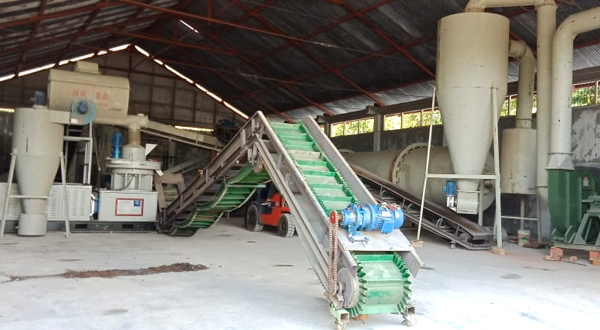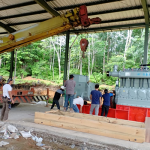Mini CPO Factory Ready for Operation
Jakarta, Induk KUD – “Don’t be afraid to make farmers and fishermen wealthy. You will not become poor just because you make farmers and fishermen wealthy. If you make farmers and fishermen prosperous, you will undoubtedly become wealthier.” This statement is often uttered by the Chairman of Induk KUD, Herman Wutun, on every occasion during the signing of business cooperation with foreign business partners.
As an experienced cooperative figure, Herman Wutun believes that cooperatives are the most effective instrument for economic equality, not only in income distribution but also in wealth; through cooperatives, society can achieve not only income fairness but also provide opportunities for small communities to create wealth.
Therefore, in every business cooperation with foreign business partners, Herman Wutun always emphasizes that the collaboration is not merely about business matters, but also includes a broader social dimension to improve the welfare of farmers and fishermen through fair income and wealth distribution.
This commitment is reflected in the partnership between Induk KUD and Controlnet, Taiwan, in developing a 5-ton/hour Mini CPO Factory and a 0.5 MW Biomass Power Plant in Jambi. This project, besides being business-oriented, aims to accommodate palm oil production from smallholder palm oil plantations, most of which are Induk KUD’s farmer members, as they are not accommodated by large corporate factories that already have their own plantations and processing facilities located far away.
This effort by Induk KUD is to assist the government in reducing inter-regional inequality and economic growth disparity, while also empowering Pusat KUD Jambi, KUD, and palm oil farmer members around the factory.
According to Herman Wutun, smallholder palm oil plantations are generally scattered and not located near the main palm oil processing centers, which are usually situated in the middle or near large corporate plantations. Herman Wutun added that many palm oil farmers rely on large CPO factories to process their palm oil despite being far from their plantations.
“This is a problem that puts pressure on the income of palm oil farmers, but the availability of Mini CPO Factories opens up possibilities to overcome this issue.” “We are building Mini CPO Factories close to smallholder palm oil plantations, not only reducing transportation costs but also providing price options for palm oil farmers,” he added.
Herman Wutun explained that the Mini CPO Factory has a capacity of 5 tons per hour and produces CPO that meets RSPO (Roundtable on Sustainable Palm Oil) quality standards. The technology and production machines used are entirely from Taiwan and environmentally friendly. Waste from Fresh Fruit Bunch (FFB) processing is recycled to generate electricity. “We are also building a 0.5 MW Biomass Power Plant near the Mini CPO Factory.” “The waste from FFB processing will be used for the electricity generator, not only for the Mini CPO Factory’s needs but also for the benefit of palm oil farmers and the local community around the Mini CPO Factory,” he explained.
The Mini CPO Factory and 0.5 MW Biomass Power Plant have reached the final stage of completion and are undergoing production testing. According to the CEO of Induk KUD, Portasius Nggedi, the CPO production test began in early May 2019, and after the machine settings are completed, the 0.5 MW Biomass Power Plant will also undergo testing.
“The Mini CPO Factory is technically ready for production.” “It is planned to be inaugurated in July 2019, coinciding with the Annual General Meeting of Induk KUD for the Fiscal Year 2018 in Jambi,” he said. “If everything goes according to schedule, we will build another Mini CPO Factory in Sungai Bahar Jambi, North Sumatra, and South Kalimantan,” concluded Portasius Nggedi. (TAB)




